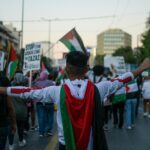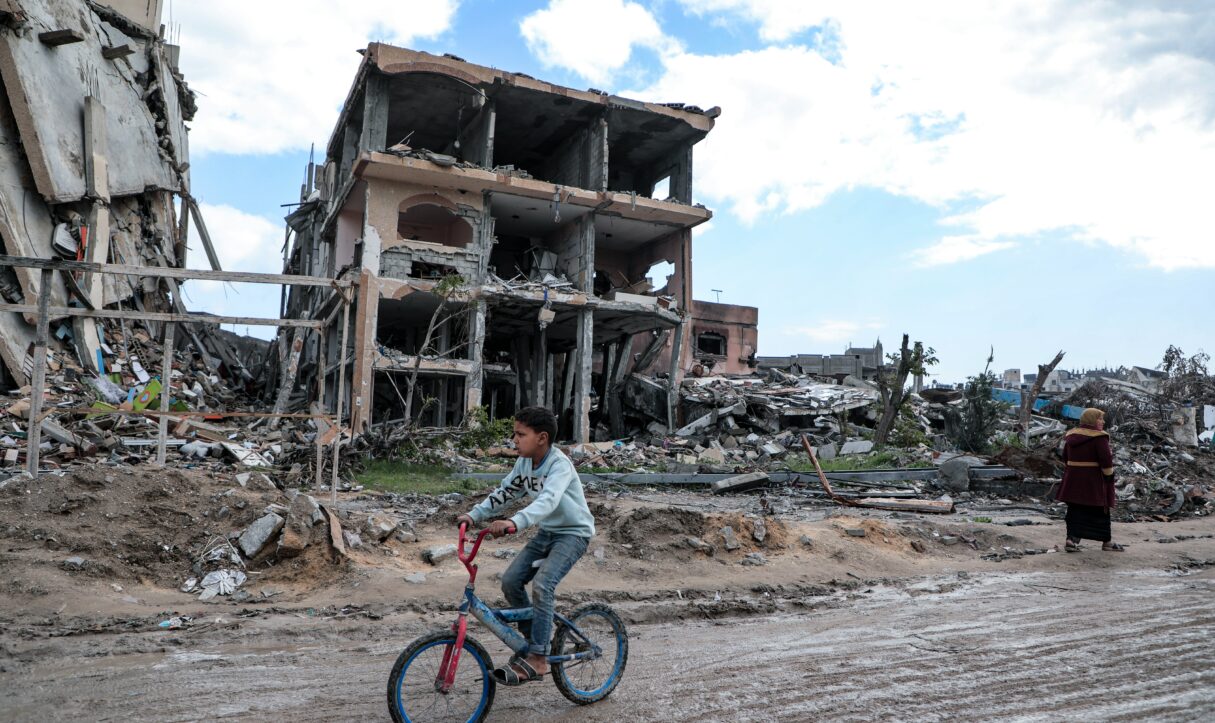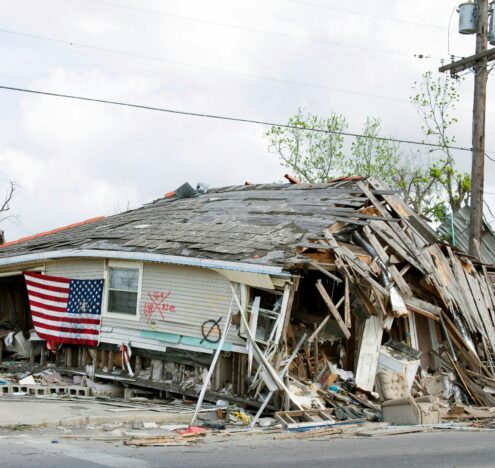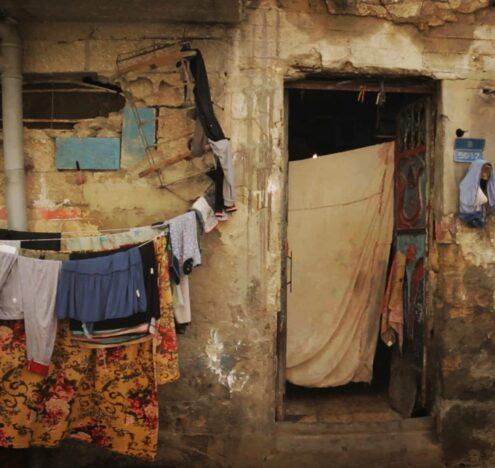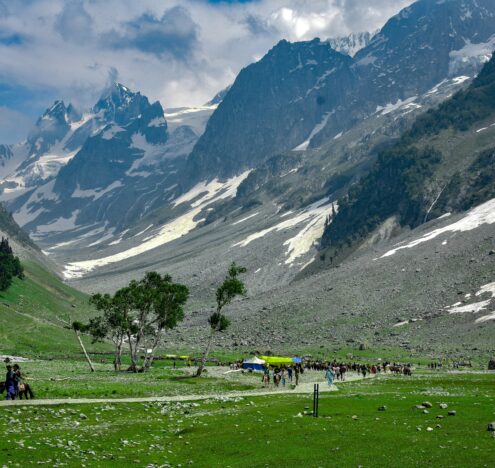In the Gaza Strip, we are dying silently. I came to this realization when my grandfather passed away last October. He needed medicine and food, and his chances of recovery would have been higher if there had been no war. He left with a frail body, nothing but bones covered by skin, quietly suffering.
When I last saw my grandfather, he tried to hug me, but his body was too weak to move. The moment of his final farewell, I lost faith in the rhetoric of humanitarianism. The harsh truth? The longer Israel’s war on Gaza continues, the more the world becomes accustomed to the news of our deaths, to the idea that our blood is worth less than others’.
As a writer from Gaza, I’ve tried and tried again to emphasize that we are ordinary human beings. We have lives, stories, and goals. Our martyrs aren’t just numbers but individuals with stolen dreams and loved ones who remember them every night. The war has killed more than 50,000, and each one had a life.
*
The disparity between our lives and everyone else’s became clear to me during recent negotiations over one hostage. To stop the starvation of two million Palestinians in Gaza, negotiations determined, the Israeli soldier Edan Alexander, who has US citizenship, would leave captivity in the Strip. But Israel continued to block aid, no serious ceasefire agreements came, and the United States went on exercising its veto in the United Nations Security Council.
Meanwhile, the simple task of retrieving humanitarian aid has become a spectacle of death. Earlier this month, for instance, Israeli forces opened fire on Palestinians waiting to get flour at an aid distribution site, killing at least 51. My mother has taken to calling flour “white gold” — it is, after all, scarce and expensive. For my part, I see flour as “soaked in blood.” Even after the war ends, I will never see it as just a bag of flour — it will always be a cause of death.
*
I’ve recently heard from relatives who went to retrieve flour about the humiliation they endured, the long walks among rubble and sand hills, and the random Israeli gunfire. Who turns bread into a trap? What kind of policy frames bread as a matter of security?
We must travel to Rafah to even obtain aid — and no one knows whether a father will return to his children with food, shot and wrapped in a white shroud, or die along the way at the hands of the hunger that famine and malnutrition have brought. Meanwhile, Israeli Prime Minister Benjamin Netanyahu brazenly denies there is any famine in Gaza. Why are our bodies emaciated? In Netanyahu’s words, we just don’t exercise enough.
Are our demands so much? We want safety and the right to survive. In response, Israel besieges us by land, air, and sea. If I tried to escape the horrors of this war with my life, I’d have to make it through the Rafah crossing into Egypt — and that costs $5,000 a person. Otherwise, what — I’m doomed to die here?
Are our demands so much?
A year after the Israeli army invaded the city of Rafah, effectively erasing it from the map, it has raised the Israeli flag and turned the crossing into a passageway for its tanks. As for the sea, there’s no respite there either. Before the war, Palestinian fishermen could take their boats out six nautical miles — and since the war started, they risk Israeli gunfire for simply passing the 100-meter mark.
*
In conditions as harsh as these, you have no choice but to adapt. We’ve tried to adapt to a life that doesn’t resemble us at all. We adapted to shortages and high prices. We’ve invented alternatives to flour. We’ve kneaded pasta and lentils to make bread. We’ve replaced meat with canned foods, and market shortages have now made it even more difficult to find these. Onion, egg, garlic, lemon — unlikely, if not impossible, to find. If you managed to hunt down a single egg or onion, it would cost you $20.
At the market, I see confused, depressed faces standing before many substitutes that do not, cannot, replace the original food. These substitutes have no taste. In fact, they resemble our life under war — soulless — but the difference is that these products are more expensive than death here. Death, well, that’s as cheap as it is abundant.
Some people might tell you the survival instinct forces people to adapt to life under war, but let me tell you: no one in Gaza, including myself, has gotten used to rockets and bombings. Each time a missile whistles through the sky, it brings with it the fear that it will land on your home. Every new explosion rattles me as if I’m hearing it for the first time. Even the sound of a door slamming shut frightens me.
Is it fair that I fear the sound of a door closing? Is it fair that, a few kilometers away, Israelis live in comparable safety and calm? Is it fair that, for Palestinians, even a hospital can become a grave? That no one — not even a doctor — is safe?
*
In December 2023, we received a devastating call. Israeli forces had arrested my father’s colleague Dr. Ahmad Mehanna from Al-Awda Hospital in Jabalia. Dr. Ahmad is an anesthesiologist known for his dedication to his work and service to his patients even during the hardest times of the war.
The army stormed the hospital and hauled him off without charges. My father spoke to his brother on the phone with a broken voice. He described how he had tried for a year to communicate through a lawyer with no success. We heard from a former prisoner that Ahmad succumbed to shock and a nervous breakdown, that he even stopped speaking with anyone, that prison guards unleashed dogs on him to bite him.
He was not alone. In January 2025, more than 10,000 Palestinians languished in Israeli detention. Among them were 3,376 administrative detainees stuck in frozen time since their arrests — Israel holds them on “secret evidence,” without charges, and oftentimes with no acknowledgment of their existence. They often spend their days locked in cages, blindfolded, and denied even a glimpse of the sun. Their families don’t know if they’re dead beneath the rubble somewhere or withering away in prison. We’ve heard time and again about Edan Alexander and the other hostages in Gaza, but our prisoners remain forcibly disappeared in the shadows.
But whether behind bars or on the outside, Palestinians in Gaza are living through the daily reminder of what Israeli impunity really means: burning, bombing, torture. Crimes that far exceed what happened on Oct. 7, 2023. Crimes that have turned Gaza into an endless reel of massacres.
*
Like all children in Gaza, my 10-year-old sister, Joud, and my five-year-old cousin, Saleh, know the difference between the sound of a rocket exploding and a tank shell exploding. They ought to be at school, thinking about math problems and maybe drawing the sea. Instead, they’ve learned to identify the different types of planes in the skies above us. Joud says the plane that sounds like a massive bee buzzing is a reconnaissance plane. The one that sounds like thunderous noise? A fighter jet.
As her older sister, I try to explain that what we’re living isn’t normal. That the war will end soon. That she will return to school and buy drawing notebooks the way she used to. I remind her of little dreams the war has erased. I try to revive her beautiful memories. Still, I know that what she has witnessed has turned her into a prisoner of reality. Her greatest wish now is to merely eat her favorite meal: maftoul.
It’s a traditional dish made of semolina mixed with salt and water, sifted and rolled by hand to form small grains, then cooked and served with chicken and stew. It contains onions, tomatoes, and squash. Since the latest siege, nearly every one of these ingredients has disappeared. Chicken is out of the question, and even salt has become too expensive.
*
Even as I write this, Israel bombed another residential building, killing all 50 of its residents. Fifty, 100, 1,000, 50,000 — the genocide doesn’t stop. What number is the world looking for? Is there a tally that will wake you up and end the war? Or are Palestinians doomed to wait for Israel to simply tire of killing us?
One thing I know is that nothing is more difficult than living on the margins of humanity. Without a voice, without protection, and without value for your blood. Our lives have been reduced to one endless, ongoing call for everyone who still has a conscience: to see us, to hear us, to recognize us as human beings made of flesh and blood — neither mere numbers in news headlines nor bargaining chips politicians flick around at a negotiating table.







